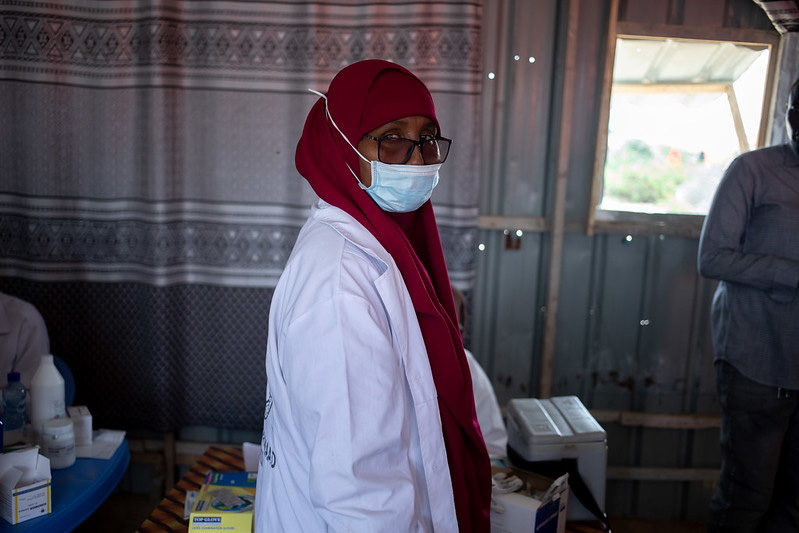 8 March 2024, Mogadishu, Somalia – Somalia’s health ministry and WHO observed International Women’s Day 2024 with a resolve to improve life for women in Somalia by empowering the female health workforce. To do so, they will address policy, human resource and operational matters, as well as capacity-building gaps for women in the health sector.
8 March 2024, Mogadishu, Somalia – Somalia’s health ministry and WHO observed International Women’s Day 2024 with a resolve to improve life for women in Somalia by empowering the female health workforce. To do so, they will address policy, human resource and operational matters, as well as capacity-building gaps for women in the health sector.
“Invest in women: Accelerate progress” is this year’s theme for the global day – and a timely reminder to world leaders to meet the targets of Sustainable Development Goal 3.
Dr Naima Abdulkadir, Manager of Reproductive Health at the Federal Ministry of Health and Human Services, thanked WHO for its support to various capacity-building efforts by the Ministry. She said she hoped: “WHO will continue to invest in trainings like mid-level management, integrated management of newborn and childhood illnesses, basic as well as emergency obstetric and newborn care, maternal and perinatal death surveillance and response and support for survivors of gender-based violence, because initial results of these trainings have been very encouraging and it will surely help in women’s empowerment in the health sector especially in newly liberated areas and in decision-making bodies.”
Life is harsh for many girls and women in the country. Somalia ranks fourth lowest among all countries globally for gender equality; its maternal and infant mortality rates are some of the highest in the world; and child marriage is widespread.
Women are often more affected than men by the recurring climatic shocks and ongoing conflicts that cause mass displacement across the country. More than 80% of the country’s 3.8 million internally displaced people are women and children. Many of them lack access to basic health services such as psychosocial support, reproductive health services, child and adolescent health services, and support for survivors of gender-based violence.
Somalia remains one of the most dangerous places to give birth. One in 1000 girls and women of reproductive age (15–49 years) die due to pregnancy or birth-related complications. Access to antenatal and postnatal care is still very limited: only 24% of women receive the WHO-recommended 4 or more antenatal care sessions during their pregnancy.
Despite recurring droughts, the COVID-19 pandemic and El Niño-related floods in Somalia, WHO and the Federal Ministry of Health and Human Services have made some progress in addressing women’s health issues under the wider umbrella of universal health coverage.
WHO Somalia supported the Ministry to revise (and cost the operational plan for) the National Reproductive, Maternal, Newborn, Child and Adolescent Health (RMNCAH) Strategy for 2023–2027. It also helped developing various guidelines for health worker capacity-building and for preparing women for health sector leadership roles.
The National Health Professionals Council, the regulatory framework for health professionals, is accelerating the process for registration of nurses and midwives, mostly women. In terms of patients’ right to health, the regulations and code of conduct are promoting the entitlement of women to decide about medical treatment, a critical step on a long way.
Dr Al-Umra Umar, Programme Lead for RMNCAH at WHO Somalia, welcomed the validation of the National RMNCAH Strategy, and added: “To tackle the high maternal and neonatal as well as under-five mortality, we urge the donor community to step up and help WHO streamline and reform the health sector by investing in an evidence-based and women-centred futuristic roadmap.”
“Slowly but gradually, we have managed to assemble an accountable and measurable framework to help address the predicaments of Somalia’s women, newborns and adolescents,” she said. “We will continue to build the capacities of women to help them take on decision-making and leadership roles.”
Media contacts
For more information, please contact:
Fouzia Bano, Communications Officer, WHO Somalia
Email:
This e-mail address is being protected from spambots. You need JavaScript enabled to view it
Saeed Ahmed, Donor Reporting and External Relations Officer, WHO Somalia
Email:
This e-mail address is being protected from spambots. You need JavaScript enabled to view it
Notes to editors
Somalia has some of the highest rates of neonatal and under-five mortality in the world, with an under-five mortality rate of 117 per 1000 live births. In addition, more than 1.5 million children aged under 5 years are currently at risk of severe malnutrition and related health complications due to the ongoing drought crisis. Somalia has a significant population of young people: over 45% of the population is aged under 15 years; about 75% of the population is aged under 30 years.
The latest Somali Health and Demographic Survey shows that female genital mutilation affects 99.2% of girls and women aged 15–49 years. This harmful practice has both short- and long-term physiological, sexual and psychological impacts. Gender-based violence is one of the most prevalent human rights violations faced by people, women especially, across the globe. Since the outbreak of COVID-19, women and girls have faced an even greater risk of such violence. Moreover, 35% of girls in Somalia go through child marriage, and there is no legal framework to stop it in courts.
Somalia’s gross domestic product per capita has consistently ranked among the 5 lowest in the world over the last decade; in 2020, it was the second lowest globally. In 2019, the International Labour Organization estimated labour force participation among those aged 15–64 years at 73.6% for men and just 23.1% for women. These figures have been relatively stable over the past 10 years. Agriculture still employs more men (79.2% of the labour force) and women (83.9%) than any other sector.




